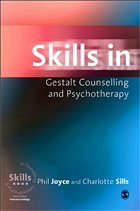Main description:
`I looked forward to reading this book and was not disappointed. It reflects the best of the Gestalt approach - it is clear, challenging and refreshing. Emphasis is placed on the importance of a safe and supporting framework within which therapeutic work takes place, and this is reflected in the reader feeling a real connection with the authors.
The humanistic element of Gestalt comes through clearly in this book. Not only is this an important read for those training in Gestalt but it is equally important for trainees and established therapists in the humanistic and integrated field' - Counsellingbooks.com
`This book was put on our reading list for diploma students in humanistic counselling, and it has been snapped up by the students' - Bee Springwood, Self Society
'Written in a clear and accessible style, this slim volume will be valued as a wise guide in attaining the necessary skills for a Gestalt flavoured clinical practice... It is in the reference material from Gestalt practitioners across the world that the authors provide a succinct integration of Gestalt theory and practice from these last fifty years. This is one of the understated but powerful aspects of the book... I recommend that all Gestalt practitioners get a copy of Skills in Gestalt Counselling Psychotherapy for their professional library and make sure that it is mandatory reading for their students' - Dorothy E Siminovitch, A Gestalt Guide for the Journey of Skill Development
'An informative book, well worth the money, that will enrich the practice of any practitioner' - Stress News
Skills in Gestalt Counselling Psychotherapy is a practical introduction to the different techniques used at each stage of the counselling process. The book takes the reader through the process from beginning to termination and focuses on skills which arise out of Gestalt theory as well as those invoked by the counselling relationship.
Accessibly written by experienced practitioners, the book gives clear guidelines on: establishing the relationship; assessment and goal-setting; developing the client's awareness; maintaining the relationship and bringing the counselling to an end.
The authors also examine the spiritual dimension of counselling and offer guidance on some of the special considerations affecting counsellors such as the context in which they are working, the duration of the relationship, and particular problems with which clients present. For all those training in Gestalt or who wish to sharpen their skills as practitioners, this will be essential reading.
Table of contents:
Preparing for the Journey
Phenomenology and Field Theory
Awareness
Establishing the Therapeutic Relationship
Assessment and Diagnosis
Treatment Considerations
Strengthening Support
Experimenting
Modifications to Contact
Unfinished Business
Transference and Counter-Transference
Body Process and Regression
Practice Issues
The Wider Field
Ending the Journey
`I looked forward to reading this book and was not disappointed. It reflects the best of the Gestalt approach - it is clear, challenging and refreshing. Emphasis is placed on the importance of a safe and supporting framework within which therapeutic work takes place, and this is reflected in the reader feeling a real connection with the authors.
The humanistic element of Gestalt comes through clearly in this book. Not only is this an important read for those training in Gestalt but it is equally important for trainees and established therapists in the humanistic and integrated field' - Counsellingbooks.com
`This book was put on our reading list for diploma students in humanistic counselling, and it has been snapped up by the students' - Bee Springwood, Self Society
'Written in a clear and accessible style, this slim volume will be valued as a wise guide in attaining the necessary skills for a Gestalt flavoured clinical practice... It is in the reference material from Gestalt practitioners across the world that the authors provide a succinct integration of Gestalt theory and practice from these last fifty years. This is one of the understated but powerful aspects of the book... I recommend that all Gestalt practitioners get a copy of Skills in Gestalt Counselling Psychotherapy for their professional library and make sure that it is mandatory reading for their students' - Dorothy E Siminovitch, A Gestalt Guide for the Journey of Skill Development
'An informative book, well worth the money, that will enrich the practice of any practitioner' - Stress News
Skills in Gestalt Counselling Psychotherapy is a practical introduction to the different techniques used at each stage of the counselling process. The book takes the reader through the process from beginning to termination and focuses on skills which arise out of Gestalt theory as well as those invoked by the counselling relationship.
Accessibly written by experienced practitioners, the book gives clear guidelines on: establishing the relationship; assessment and goal-setting; developing the client's awareness; maintaining the relationship and bringing the counselling to an end.
The authors also examine the spiritual dimension of counselling and offer guidance on some of the special considerations affecting counsellors such as the context in which they are working, the duration of the relationship, and particular problems with which clients present. For all those training in Gestalt or who wish to sharpen their skills as practitioners, this will be essential reading.
Table of contents:
Preparing for the Journey
Phenomenology and Field Theory
Awareness
Establishing the Therapeutic Relationship
Assessment and Diagnosis
Treatment Considerations
Strengthening Support
Experimenting
Modifications to Contact
Unfinished Business
Transference and Counter-Transference
Body Process and Regression
Practice Issues
The Wider Field
Ending the Journey
